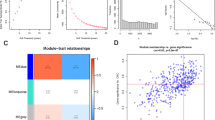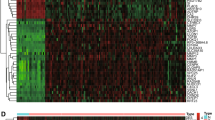Abstract
The molecular mechanisms underlying colon cancer lesions at different sites are not entirely clear. Herein, we aimed to explore location-specific gene profiles related to the pathogenesis of colon cancer and to identify their function. The robust rank aggregation (RRA) method was used to integrate colon cancer microarray datasets and screen differentially expressed gene (DEG) profiles between left- and right-sided colon cancers. Then, weighted gene co-expression network analysis (WGCNA) was performed to cluster the DEGs into modules and identify hub genes. The selected hub genes were validated using The Cancer Genome Atlas dataset and clinical tissues. We assessed the association of selected hub genes with the methylation status in immune cells. In total, 905 DEGs were identified by RRA; five gene modules and 18 hub genes were related to the clinical traits of colon cancer by WGCNA. Four hub genes were selected and shown to be associated with colon cancers on different sides and distant metastasis in the validation analysis. The four hub genes showed a low methylation status, and their expression was significantly associated with methylation status. Positive correlations were observed between the four hub genes and tumor purity and among the four types of immune cells. Gene set enrichment analysis revealed that the four hub genes were mainly involved in two cancer-related pathways. In conclusion, this study identified a set of location-specific genes related to the pathogenesis of colon cancer. These four hub genes may act as novel candidate targets for the treatment of colon cancer.









Similar content being viewed by others
Data availability
The datasets used during the present study are available from the corresponding author upon reasonable request. All raw data of COAD can be downloaded freely from TCGA database and GEO database.
References
Mik M, Berut M, Dziki L, Trzcinski R, Dziki A. Right- and left-sided colon cancer—clinical and pathological differences of the disease entity in one organ. Arch Med Sci. 2017;13(1):157–62. https://doi.org/10.5114/aoms.2016.58596.
Mesa H, Manivel JC, Larson WS, Dachel SK, Reinink AR, Jessurun J. Immunophenotypic comparison of neoplasms of the appendix, right colon, and left colon in search of a site-specific phenotypic signature. Int J Surg Pathol. 2019. https://doi.org/10.1177/1066896919859096.
Stintzing S, Tejpar S, Gibbs P, Thiebach L, Lenz HJ. Understanding the role of primary tumour localisation in colorectal cancer treatment and outcomes. Eur J Cancer. 2017;84:69–80. https://doi.org/10.1016/j.ejca.2017.07.016.
Shen H, Yang J, Huang Q, Jiang MJ, Tan YN, Fu JF, et al. Different treatment strategies and molecular features between right-sided and left-sided colon cancers. World J Gastroenterol. 2015;21(21):6470–8. https://doi.org/10.3748/wjg.v21.i21.6470.
Lee MS, Menter DG, Kopetz S. Right versus left colon cancer biology: integrating the consensus molecular subtypes. J Natl Compr Cancer Netw. 2017;15(3):411–9.
Vlachavas EI, Pilalis E, Papadodima O, Koczan D, Willis S, Klippel S, et al. Radiogenomic analysis of F-18-fluorodeoxyglucose positron emission tomography and gene expression data elucidates the epidemiological complexity of colorectal cancer landscape. Comput Struct Biotechnol J. 2019;17:177–85. https://doi.org/10.1016/j.csbj.2019.01.007.
Ma YS, Huang T, Zhong XM, Zhang HW, Cong XL, Xu H, et al. Proteogenomic characterization and comprehensive integrative genomic analysis of human colorectal cancer liver metastasis. Mol Cancer. 2018;17(1):139. https://doi.org/10.1186/s12943-018-0890-1.
Choi JK, Yu U, Kim S, Yoo OJ. Combining multiple microarray studies and modeling interstudy variation. Bioinformatics. 2003;19(Suppl 1):i84–90. https://doi.org/10.1093/bioinformatics/btg1010.
Sun X, Shan Y, Li Q, Chollet-Hinton L, Kirk EL, Gierach GL, et al. Intra-individual gene expression variability of histologically normal breast tissue. Sci Rep. 2018;8(1):9137. https://doi.org/10.1038/s41598-018-27505-y.
Ritchie ME, Phipson B, Wu D, Hu Y, Law CW, Shi W, et al. Limma powers differential expression analyses for RNA-sequencing and microarray studies. Nucleic Acids Res. 2015;43(7):e47. https://doi.org/10.1093/nar/gkv007.
Kolde R, Laur S, Adler P, Vilo J. Robust rank aggregation for gene list integration and meta-analysis. Bioinformatics. 2012;28(4):573–80. https://doi.org/10.1093/bioinformatics/btr709.
Li T, Fan J, Wang B, Traugh N, Chen Q, Liu JS, et al. TIMER: a web server for comprehensive analysis of tumor-infiltrating immune cells. Cancer Res. 2017;77(21):e108–e110110. https://doi.org/10.1158/0008-5472.CAN-17-0307.
Yu G, Wang LG, Han Y, He QY. clusterProfiler: an R package for comparing biological themes among gene clusters. OMICS. 2012;16(5):284–7. https://doi.org/10.1089/omi.2011.0118.
Livak KJ, Schmittgen TD. Analysis of relative gene expression data using real-time quantitative PCR and the 2(-Delta Delta C(T)) Method. Methods. 2001;25(4):402–8. https://doi.org/10.1006/meth.2001.1262.
Jorissen RN, Gibbs P, Christie M, Prakash S, Lipton L, Desai J, et al. Metastasis-associated gene expression changes predict poor outcomes in patients with dukes stage B and C colorectal cancer. Clin Cancer Res. 2009;15(24):7642–51. https://doi.org/10.1158/1078-0432.CCR-09-1431.
Tsuji S, Midorikawa Y, Takahashi T, Yagi K, Takayama T, Yoshida K, et al. Potential responders to FOLFOX therapy for colorectal cancer by Random Forests analysis. Br J Cancer. 2012;106(1):126–32. https://doi.org/10.1038/bjc.2011.505.
Loboda A, Nebozhyn MV, Watters JW, Buser CA, Shaw PM, Huang PS, et al. EMT is the dominant program in human colon cancer. BMC Med Genomics. 2011;4:9. https://doi.org/10.1186/1755-8794-4-9.
Sheffer M, Bacolod MD, Zuk O, Giardina SF, Pincas H, Barany F, et al. Association of survival and disease progression with chromosomal instability: a genomic exploration of colorectal cancer. Proc Natl Acad Sci USA. 2009;106(17):7131–6. https://doi.org/10.1073/pnas.0902232106.
Del Rio M, Mollevi C, Bibeau F, Vie N, Selves J, Emile JF, et al. Molecular subtypes of metastatic colorectal cancer are associated with patient response to irinotecan-based therapies. Eur J Cancer. 2017;76:68–75. https://doi.org/10.1016/j.ejca.2017.02.003.
Okita A, Takahashi S, Ouchi K, Inoue M, Watanabe M, Endo M, et al. Consensus molecular subtypes classification of colorectal cancer as a predictive factor for chemotherapeutic efficacy against metastatic colorectal cancer. Oncotarget. 2018;9(27):18698–711. https://doi.org/10.18632/oncotarget.24617.
Tran Janco JM, Lamichhane P, Karyampudi L, Knutson KL. Tumor-infiltrating dendritic cells in cancer pathogenesis. J Immunol. 2015;194(7):2985–91. https://doi.org/10.4049/jimmunol.1403134.
Ge P, Wang W, Li L, Zhang G, Gao Z, Tang Z, et al. Profiles of immune cell infiltration and immune-related genes in the tumor microenvironment of colorectal cancer. Biomed Pharmacother. 2019;118:109228. https://doi.org/10.1016/j.biopha.2019.109228.
Song ZY, Chao F, Zhuo Z, Ma Z, Li W, Chen G. Identification of hub genes in prostate cancer using robust rank aggregation and weighted gene co-expression network analysis. Aging (Albany NY). 2019;11(13):4736–56. https://doi.org/10.18632/aging.102087.
Liu L, He C, Zhou Q, Wang G, Lv Z, Liu J. Identification of key genes and pathways of thyroid cancer by integrated bioinformatics analysis. J Cell Physiol. 2019. https://doi.org/10.1002/jcp.28932.
Brown AR, Simmen RC, Simmen FA. The role of thyroid hormone signaling in the prevention of digestive system cancers. Int J Mol Sci. 2013;14(8):16240–57. https://doi.org/10.3390/ijms140816240.
Langfelder P, Horvath S. WGCNA: an R package for weighted correlation network analysis. BMC Bioinform. 2008;9:559. https://doi.org/10.1186/1471-2105-9-559.
Yang W, Shi J, Zhou Y, Liu T, Li J, Hong F, et al. Co-expression network analysis identified key proteins in association with hepatic metastatic colorectal cancer. Proteomics Clin Appl. 2019. https://doi.org/10.1002/prca.201900017.
Lee JH, Ahn BK, Baik SS, Lee KH. Comprehensive analysis of somatic mutations in colorectal cancer with peritoneal metastasis. Vivo. 2019;33(2):447–52. https://doi.org/10.21873/invivo.11493.
Yang G, Zhang T, Ye J, Yang J, Chen C, Cai S, et al. Circ-ITGA7 sponges miR-3187-3p to upregulate ASXL1, suppressing colorectal cancer proliferation. Cancer Manag Res. 2019;11:6499–509. https://doi.org/10.2147/CMAR.S203137.
Miyata Y, Kumagai K, Nagaoka T, Kitaura K, Kaneda G, Kanazawa H, et al. Clinicopathological significance and prognostic value of Wilms' tumor gene expression in colorectal cancer. Cancer Biomark. 2015;15(6):789–97. https://doi.org/10.3233/CBM-150521.
Qiang Z, Jun-Jie L, Hai W, Hong L, Bing-Xi L, Lei C, et al. TPD52L2 impacts proliferation, invasiveness and apoptosis of glioblastoma cells via modulation of wnt/beta-catenin/snail signaling. Carcinogenesis. 2018;39(2):214–24. https://doi.org/10.1093/carcin/bgx125.
Pan ZY, Yang Y, Pan H, Zhang J, Liu H, Huang G, et al. Lentivirus-mediated TPD52L2 depletion inhibits the proliferation of liver cancer cells in vitro. Int J Clin Exp Med. 2015;8(2):2334–411.
Wu M, Ho SM. PMP24, a gene identified by MSRF, undergoes DNA hypermethylation-associated gene silencing during cancer progression in an LNCaP model. Oncogene. 2004;23(1):250–9. https://doi.org/10.1038/sj.onc.1207076.
Acknowledgements
This study was partially supported by National Natural Science Foundation (No. 81260083), Natural Science Foundation of Guangxi (No. 2018JJA140136), and Guangxi University Students Innovation and Entrepreneurship Project (WLXSZX19039; 201910598012; 201910598241). Guangxi Medical Scientific Research Project (Z20200334)
Author information
Authors and Affiliations
Contributions
Study concept and design: SC and HBL; Collection and assembly of data: SC and LKZ; Performed the experiment: LKZ and LJL; Data analysis and interpretation: HBL, LL, and LKZ; Revised the manuscript: DK, SC; Manuscript writing and review: All authors.
Corresponding author
Ethics declarations
Conflict of interest
The authors declare that they have no conflict of interest.
Additional information
Publisher's Note
Springer Nature remains neutral with regard to jurisdictional claims in published maps and institutional affiliations.
Electronic supplementary material
Below is the link to the electronic supplementary material.
Rights and permissions
About this article
Cite this article
Shi, C., Ding, K., Li, Kz. et al. Comprehensive analysis of location-specific hub genes related to the pathogenesis of colon cancer. Med Oncol 37, 77 (2020). https://doi.org/10.1007/s12032-020-01402-9
Received:
Accepted:
Published:
DOI: https://doi.org/10.1007/s12032-020-01402-9




